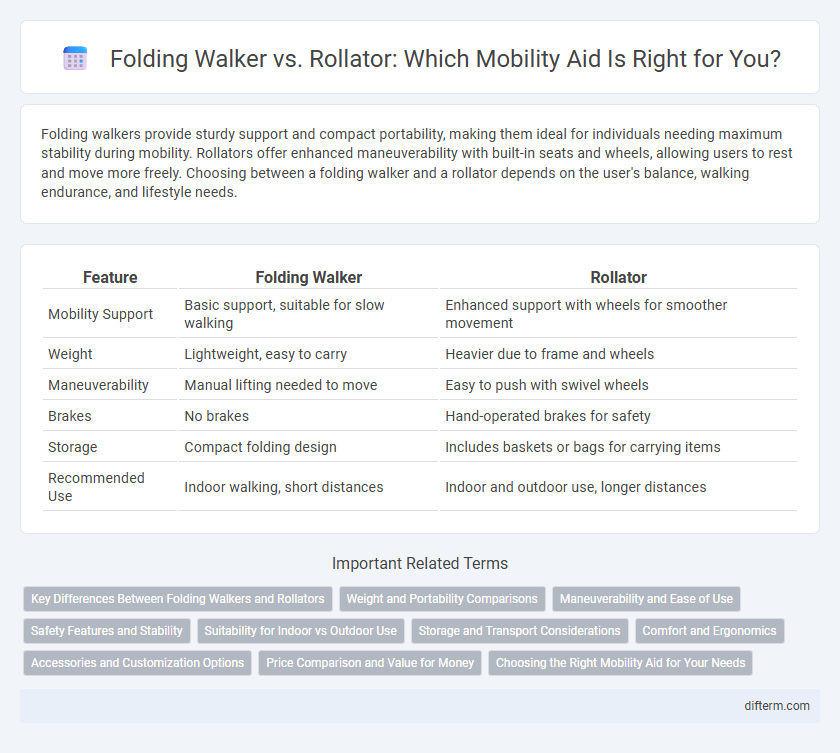Folding walkers provide sturdy support and compact portability, making them ideal for individuals needing maximum stability during mobility. Rollators offer enhanced maneuverability with built-in seats and wheels, allowing users to rest and move more freely. Choosing between a folding walker and a rollator depends on the user's balance, walking endurance, and lifestyle needs.
Table of Comparison
| Feature | Folding Walker | Rollator |
|---|---|---|
| Mobility Support | Basic support, suitable for slow walking | Enhanced support with wheels for smoother movement |
| Weight | Lightweight, easy to carry | Heavier due to frame and wheels |
| Maneuverability | Manual lifting needed to move | Easy to push with swivel wheels |
| Brakes | No brakes | Hand-operated brakes for safety |
| Storage | Compact folding design | Includes baskets or bags for carrying items |
| Recommended Use | Indoor walking, short distances | Indoor and outdoor use, longer distances |
Key Differences Between Folding Walkers and Rollators
Folding walkers typically feature a lightweight frame with four fixed wheels or no wheels, designed for stability and ease of folding for transport or storage, whereas rollators usually have three or four wheels with hand brakes and a built-in seat for enhanced mobility and longer resting periods. Rollators offer better maneuverability on uneven terrain due to their larger wheels, while folding walkers provide more support for users needing balance assistance. The choice between folding walkers and rollators depends on the user's mobility level, terrain preference, and need for portability versus support features.
Weight and Portability Comparisons
Folding walkers typically weigh between 5 to 9 pounds, making them lighter and easier to lift compared to rollators, which range from 15 to 25 pounds. Their compact folding design enhances portability, fitting easily into car trunks or storage compartments, while rollators, despite having wheels and brakes for mobility, are bulkier and less convenient to transport. Users seeking a lightweight, easily portable aid often prefer folding walkers due to their minimal weight and space-saving foldable frame.
Maneuverability and Ease of Use
Folding walkers offer compact storage and lightweight design, enhancing portability but may require more effort to navigate tight spaces due to limited wheel support. Rollators feature multiple wheels and built-in brakes, providing superior maneuverability and smoother mobility over various terrains. Ease of use is typically greater with rollators, as users benefit from ergonomic handles and the ability to roll rather than lift, reducing physical strain.
Safety Features and Stability
Folding walkers offer enhanced safety features with their lightweight frame and locking mechanisms that prevent accidental collapse, providing stable support for users with limited strength or balance. Rollators, equipped with larger wheels and braking systems, deliver superior stability on uneven terrain and allow for smoother mobility indoors and outdoors. Both devices prioritize user safety, but folding walkers excel in stationary stability while rollators optimize dynamic stability during movement.
Suitability for Indoor vs Outdoor Use
Folding walkers provide compact portability and stability, making them ideal for indoor use on smooth surfaces and tight spaces. Rollators are designed for outdoor mobility, featuring larger wheels and enhanced maneuverability suitable for uneven terrain and longer distances. Users seeking versatility often choose rollators for outdoor activities, while folding walkers remain preferred for indoor support and ease of storage.
Storage and Transport Considerations
Folding walkers offer compact storage and easy portability due to their lightweight frames and simple folding mechanisms, making them ideal for tight spaces and frequent transport. Rollators, while generally bulkier, often feature quick-release wheels and foldable designs that facilitate transport in car trunks or closets but may require more effort to collapse. Selecting between the two depends on prioritizing minimal storage footprint versus additional features like built-in seats and larger wheels for outdoor mobility.
Comfort and Ergonomics
Folding walkers provide lightweight support with a compact design ideal for easy storage, offering stability through a rigid frame but often lacking padded handles for prolonged comfort. Rollators feature ergonomic handlebars with adjustable height and cushioned grips, enabling a more customized and comfortable user experience while delivering smoother mobility thanks to large swivel wheels and built-in brakes. The enhanced ergonomic design of rollators promotes better posture and reduces strain on wrists and shoulders compared to folding walkers, making them preferable for extended use.
Accessories and Customization Options
Folding walkers offer limited accessory options, primarily including lightweight trays, carrying bags, and simple baskets designed for ease of folding and transport. Rollators provide a broader range of customizable accessories such as adjustable seats, ergonomic grips, oxygen tank holders, and enhanced storage solutions tailored for user comfort and specific mobility needs. Both devices support personalization, but rollators excel in accessory versatility, accommodating a wider variety of user preferences and functional enhancements.
Price Comparison and Value for Money
Folding walkers typically cost between $50 and $150, offering a lightweight and compact design ideal for easy storage and transport, making them a budget-friendly option for basic mobility support. Rollators range from $100 to $400, providing enhanced features such as built-in seats, storage baskets, and adjustable height, which contribute to better comfort and functionality. While rollators have a higher upfront price, their added convenience and versatility often deliver greater value for money to users who require extended mobility assistance.
Choosing the Right Mobility Aid for Your Needs
When choosing the right mobility aid, consider the differences between folding walkers and rollators based on your balance, strength, and terrain needs. Folding walkers offer lightweight support and easy storage, ideal for users requiring basic stability and portability, while rollators feature wheels, seats, and brakes, providing enhanced mobility and comfort for longer distances or outdoor use. Assess your daily activities, physical abilities, and living environment to select a mobility aid that maximizes safety and independence.
Folding walker vs Rollator Infographic

 difterm.com
difterm.com